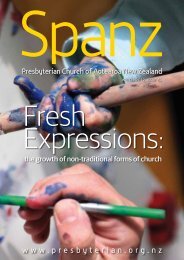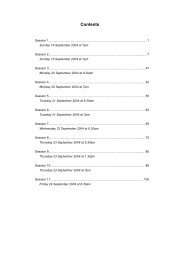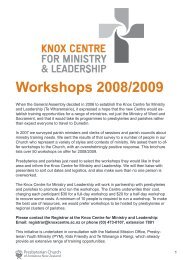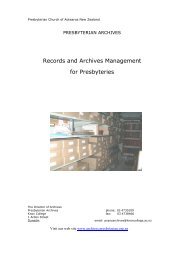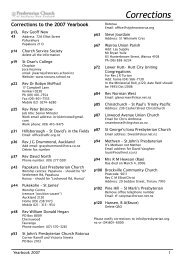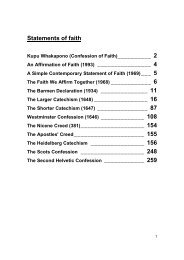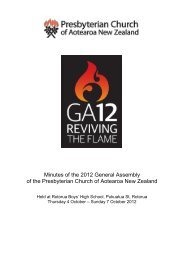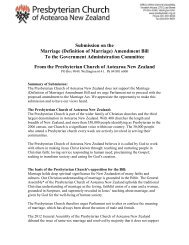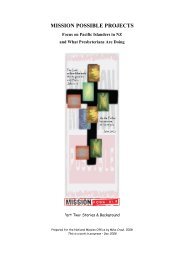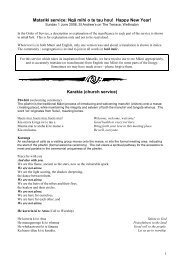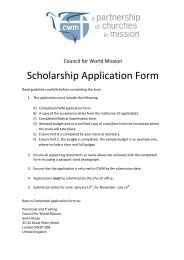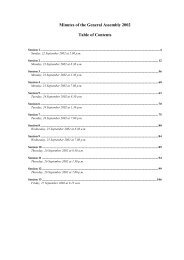Cultural diversity and unity in Christ: the Presbyterian Church of ...
Cultural diversity and unity in Christ: the Presbyterian Church of ...
Cultural diversity and unity in Christ: the Presbyterian Church of ...
You also want an ePaper? Increase the reach of your titles
YUMPU automatically turns print PDFs into web optimized ePapers that Google loves.
Charles Foster writes: “The practice <strong>of</strong> embrac<strong>in</strong>g o<strong>the</strong>rs is not easy – especially given <strong>the</strong> human<br />
proclivity to exclude, dom<strong>in</strong>ate, differentiate <strong>and</strong> oppress people who are considered to be o<strong>the</strong>r <strong>and</strong><br />
to privilege <strong>and</strong> give preference to ourselves. It beg<strong>in</strong>s with discern<strong>in</strong>g difference as a possibility – a<br />
gift – ra<strong>the</strong>r than a problem. It cont<strong>in</strong>ues with <strong>the</strong> recognition that our lives <strong>and</strong> our cultures are<br />
<strong>in</strong>extricably <strong>in</strong>tertw<strong>in</strong>ed <strong>and</strong> <strong>in</strong>terdependent – even though when exam<strong>in</strong>ed discreetly <strong>the</strong>y <strong>of</strong>ten seem<br />
to be studies <strong>in</strong> contrast. It requires <strong>the</strong> affirmation <strong>of</strong> cultural ‘o<strong>the</strong>rs’ on <strong>the</strong>ir own terms, <strong>and</strong> at <strong>the</strong><br />
same time, an affirmation <strong>of</strong> our own cultural embeddedness as a primary resource to <strong>the</strong> depths <strong>of</strong><br />
our own identities. This requires that members <strong>of</strong> each racial <strong>and</strong> cultural group grant <strong>the</strong> o<strong>the</strong>rs<br />
‘sufficient respect’ to listen <strong>and</strong> trust enough to challenge <strong>and</strong> critique. This cannot happen without<br />
shar<strong>in</strong>g power, creat<strong>in</strong>g a collaborative engagement on <strong>the</strong> issues that matters most <strong>in</strong> <strong>the</strong> common life<br />
<strong>of</strong> <strong>the</strong> congregation” 75<br />
For reflection/discussion<br />
(1) What experiences have you had where you have entered <strong>in</strong>to <strong>the</strong> world <strong>of</strong> ano<strong>the</strong>r cultural or<br />
ethnic groups <strong>in</strong> ways that you have learned from <strong>and</strong> been enriched by <strong>the</strong>m? Have any <strong>of</strong> <strong>the</strong>se<br />
changed you?<br />
(2) What are some <strong>of</strong> <strong>the</strong> steps you th<strong>in</strong>k your church could take toward becom<strong>in</strong>g more cross cultural<br />
<strong>in</strong> <strong>the</strong> way envisioned here?<br />
Some <strong>of</strong> <strong>the</strong> most helpful work <strong>the</strong>ologically <strong>and</strong> socially about this whole area <strong>of</strong> liv<strong>in</strong>g with<br />
difference <strong>and</strong> embrac<strong>in</strong>g <strong>diversity</strong> has been done by Miroslav Volf, com<strong>in</strong>g out <strong>of</strong> his experience <strong>of</strong><br />
ethnic religious conflict <strong>in</strong> Bosnia. Volf observes that <strong>the</strong> act <strong>of</strong> embrac<strong>in</strong>g <strong>in</strong>volves two movements<br />
on <strong>the</strong> part <strong>of</strong> two people or groups. A movement to create “space <strong>in</strong> myself for <strong>the</strong> o<strong>the</strong>r” <strong>and</strong> an<br />
enclos<strong>in</strong>g movement to communicate that I do not want to be without <strong>the</strong> o<strong>the</strong>r <strong>in</strong> her or his o<strong>the</strong>rness.<br />
To embrace o<strong>the</strong>rs suggests that we cannot “live au<strong>the</strong>ntically without welcom<strong>in</strong>g o<strong>the</strong>rs – <strong>the</strong> o<strong>the</strong>r<br />
gender, o<strong>the</strong>r person, o<strong>the</strong>r cultures – <strong>in</strong>to <strong>the</strong> very structure <strong>of</strong> our be<strong>in</strong>g.” 76<br />
Comment<strong>in</strong>g on Romans 15.7 “welcome one ano<strong>the</strong>r, <strong>the</strong>refore, just as <strong>Christ</strong> has welcomed you”<br />
Volf argues that <strong>the</strong> metaphor <strong>of</strong> embrace br<strong>in</strong>gs toge<strong>the</strong>r three important <strong>and</strong> <strong>in</strong>terrelated <strong>the</strong>mes:<br />
<strong>the</strong> mutuality <strong>of</strong> <strong>the</strong> self giv<strong>in</strong>g love <strong>in</strong> <strong>the</strong> tr<strong>in</strong>ity (<strong>the</strong> doctr<strong>in</strong>e <strong>of</strong> God)<br />
<strong>the</strong> outstretched arms <strong>of</strong> <strong>Christ</strong> on <strong>the</strong> cross for <strong>the</strong> world (<strong>the</strong> doctr<strong>in</strong>e <strong>of</strong> <strong>Christ</strong>)<br />
<strong>the</strong> open arms <strong>of</strong> <strong>the</strong> “fa<strong>the</strong>r” receiv<strong>in</strong>g <strong>the</strong> prodigal (<strong>the</strong> doctr<strong>in</strong>e <strong>of</strong> salvation).<br />
So he says practices <strong>of</strong> embrace refer to <strong>the</strong> movement <strong>of</strong> different peoples <strong>in</strong> comm<strong>unity</strong> that seek to<br />
be close to o<strong>the</strong>rs without los<strong>in</strong>g <strong>the</strong> <strong>in</strong>tegrity <strong>of</strong> <strong>the</strong>ir own identities. 77<br />
This image br<strong>in</strong>gs us to some <strong>of</strong> earlier ecclesiological reflection, particularly <strong>of</strong> <strong>the</strong> church <strong>in</strong> <strong>the</strong><br />
image <strong>of</strong> <strong>the</strong> tr<strong>in</strong>ity, <strong>in</strong>deed fur<strong>the</strong>r as “a fragmentary <strong>and</strong> provisional participation <strong>in</strong> <strong>the</strong> costly love<br />
<strong>of</strong> <strong>the</strong> triune God”. Rublov’s icon <strong>of</strong> <strong>the</strong> three persons <strong>of</strong> <strong>the</strong> tr<strong>in</strong>ity, Fa<strong>the</strong>r, Son <strong>and</strong> Spirit as hosts at<br />
<strong>the</strong> table welcom<strong>in</strong>g <strong>the</strong> viewer to jo<strong>in</strong> <strong>the</strong>m has been used as a powerful image for <strong>the</strong> k<strong>in</strong>d <strong>of</strong><br />
overflow<strong>in</strong>g love <strong>of</strong> our tr<strong>in</strong>itarian God for o<strong>the</strong>rs. The welcom<strong>in</strong>g communion <strong>of</strong> <strong>the</strong> Tr<strong>in</strong>ity <strong>and</strong> its<br />
connection with <strong>the</strong> k<strong>in</strong>dness to strangers, important <strong>in</strong> many cultures, develops a comprehension <strong>of</strong><br />
lov<strong>in</strong>g, hospitality that Jesus develops <strong>in</strong> his call to <strong>in</strong>vite to table those who are not part <strong>of</strong> our own<br />
social circle <strong>and</strong> who cannot repay <strong>the</strong> <strong>in</strong>vitation (Lk 14.12-14).<br />
Hospitality is a familiar word, one that is used <strong>in</strong> many contexts. Its mean<strong>in</strong>g must be radicalised if it<br />
is able to carry <strong>the</strong> freight <strong>of</strong> <strong>the</strong> k<strong>in</strong>d <strong>of</strong> response required as people <strong>of</strong> different cultures <strong>in</strong>teract with<br />
one ano<strong>the</strong>r. It models a radical hospitality as God’s welcome <strong>in</strong> which <strong>the</strong> difference <strong>of</strong> o<strong>the</strong>rs is<br />
valued <strong>and</strong> cherished <strong>in</strong> will<strong>in</strong>gness to talk with, eat with <strong>and</strong> share with <strong>the</strong> o<strong>the</strong>r, <strong>of</strong> cheek-by-jowl<br />
hospitality which <strong>in</strong>vites <strong>the</strong> o<strong>the</strong>r <strong>in</strong>to our lives <strong>and</strong> expects movement <strong>and</strong> change, ra<strong>the</strong>r than<br />
smooth corporate hospitality which provides service at arms length but does not disturb us.<br />
75 Foster, Leadership <strong>in</strong> Multicultural Congregations, 47.<br />
76 Volf, Exclusion <strong>and</strong> Embrace, 140-147.<br />
77 Volf, Exclusion <strong>and</strong> Embrace, 29.<br />
21



